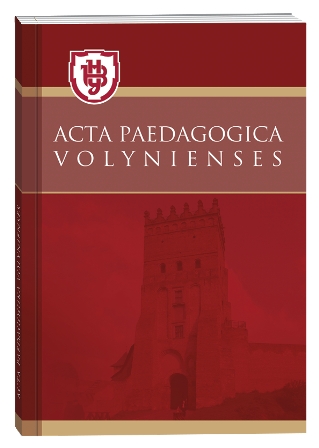PRIORITY CONDITIONS OF TRAINING OF FUTURE FORESTRY PROFESSIONALS
DOI:
https://doi.org/10.32782/apv/2021.5.26Keywords:
priority conditions, didactic conditions, pedagogical conditions, training, future specialists, forestry, forestry branch, pedagogical influenceAbstract
Purpose. The article substantiates the priority conditions for training future forestry specialists. Methodology. It is established that effective priority conditions for training future forestry specialists are: formation of value orientations of forestry specialists for personal growth, self-improvement, self-realization; stimulating the motivational sphere in professional intentions; activation of cognitive interests and needs, attitude to self-development to improve professional knowledge, skills, competencies formation of professionally important personal qualities of future specialists of the forestry industry, subjective position in mastering future professional activity. Scientific novelty. It is revealed that the first priority condition is aimed at forming the motivational sphere of future forestry specialists. This condition includes: strengthening motivation and consolidation of professional choice; formation of a positive and emotional attitude to the chosen specialty, the development of sustainable professional intentions in the forestry industry that meet the needs of the individual and society. The second priority condition is aimed at forming the cognitive sphere of future forestry specialists. This condition includes: cognitive-professional content of the learning process; activation of independence, initiative of applicants; awareness of applicants of social significance of the chosen profession; consolidation of professional choice. The third priority condition is designed to influence the formation of an effective area of future forestry professionals. This condition includes: mastering the techniques, skills of professional activity; inclusion of applicants in various types of educational and professional work; self-assessment of applicants for the results of educational and professional activities and reassessment of the level of acquisition of professional skills; ensuring professional stability, self-mastery of effective means of professional activity, behavior and communication; orientation of personality in professional values; strategic design of own professional development; self-assessment of the results of professional growth; increasing the level of professional stability by ensuring that applicants obtain related professions. Conclusions. It is established that in the course of realization of each condition the range of tasks which determines a choice of means, methods of receptions of pedagogical influence, the forms of the organization of employment defining character of activity of applicants and teachers is solved. It is proved that the developed priority conditions are an internal factor, which, supplemented by an external factor (organizational and methodological support) is aimed at improving the efficiency of the training process of future forestry specialists.
References
Вдовенко І. Зміст і методика підготовки майбутніх кваліфікованих робітників лісового господарства : дис. … канд. пед. наук : 13.00.04. Чернігів, 2007. 228 с.
Лазарєв О. Професійна підготовка майбутніх фахівців аграрного профілю на засадах компетентнісного підходу. Педагогічні науки: теорія, історія, інноваційні технології. 2014. № 1. С. 209–218.
Лаппо В. Формування духовних цінностей студентської молоді в навчально-виховному процесі вищого навчального закладу: теоретико-методичні засади : монографія. Івано-Франківськ : НАІР, 2017. 356 с.
Мілаєва І. Сучасні методи підготовки майбутнього фахівця-аграрія. Удосконалення освітньо-виховного процесу в закладі вищої освіти. 2019. Вип. 22. С. 104–111.
Стрижак Н. Шляхи удосконалення екологічної підготовки майбутніх техніків лісового господарства. Педагогіка і психологія професійної освіти. 2013. № 1. С. 120–127.
Ткач М. Створення освітнього середовища у професійній підготовці бакалаврів лісового і садово-паркового господарства. Інноваційна педагогіка. 2018. Вип. 6. С. 187–191.
Халілова С. Принципи формування проектних умінь майбутніх інженерів садово-паркового господарства. Сучасний вимір психології та педагогіки : тези доповідей міжнародної науково-практичної конференції, м. Львів, 29–30 травня 2015 р. Львів, 2015. С. 130–133.
Чеботарева Е. Развитие самообразовательной компетентности студентов в процессе проектной деятельности (на материале подготовки будущих специалистов агропромышленного комплекса) : дисс. … канд. пед. наук : 13.00.08. Курск, 2010. 241 с.
Ширяева К. Профессионально-коммуникативная подготовка студента аграрного вуза : дисс. … канд. пед. наук : 13.00.08. Волгоград, 2015. 143 с.
Шматков Є., Шматков Д. Використання моделювання при навчанні учнів професійно-технічних навчальних закладів робітничим професіям. Теорія і практика управління соціальними системами. 2009. № 2. С. 50–54.







